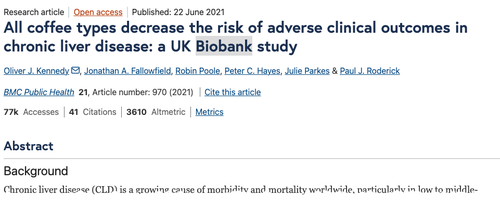Waking up for the London Stock Exchange isn't complete without the daily ritual: fire up the espresso machine, grind those dark roasted Robusta beans, and 30 seconds later—boom—a jolt of caffeine strong enough to skim a dozen Goldman, UBS, and Bank of America notes. But here's the kicker: the morning rocket fuel might be doing a lot more than energizing you for the trading session.
According to a massive UK Biobank study, coffee—yes, even the decaf, instant, and ground stuff—appears to protect against chronic liver disease (CLD).
"Coffee consumption has been linked with lower rates of CLD, but little is known about the effects of different coffee types, which vary in chemical composition," researchers from the University of Edinburgh Centre for Inflammation Research wrote in the report.
Here are the key takeaways from the study, which found that compared to non-coffee drinkers, regular coffee drinkers had a:
- 21% lower risk of incident CLD
- 20% lower risk of CLD or steatosis
- 49% lower risk of death from CLD
Dose-Response: "The maximal protective effect was seen at around 3–4 cups each day. The findings were robust to excluding events in the first 5 years. Drinkers of decaffeinated, instant, and ground coffee (including espresso) also had lower risks of incident CLD, incident CLD or steatosis, death from CLD, and, to a lesser extent, HCC, with ground coffee (including espresso) having the largest effect," the researchers found.
Researchers noted, "This study agrees with previous cohort studies that generally report inverse associations between coffee consumption and CLD outcomes, including deranged liver enzymes, fibrosis, cirrhosis, and hepatocellular carcinoma."
Biologically, coffee's protective effect is plausible. Caffeine inhibits the A2aA receptor, which otherwise promotes liver fibrosis. Yet decaffeinated coffee was also protective, pointing to other active compounds like chlorogenic acid, kahweol, and cafestol—especially concentrated in ground coffee. These compounds have shown anti-fibrotic effects in animal studies, suggesting a multifactorial mechanism behind coffee's liver-protective properties.
What better way to armor your liver and support your favorite forward-looking financial news site than by grabbing a bag of our ZeroHedge-approved coffee beans?
Top pick? The dark roast. Bold, unapologetic—just like our headlines.

